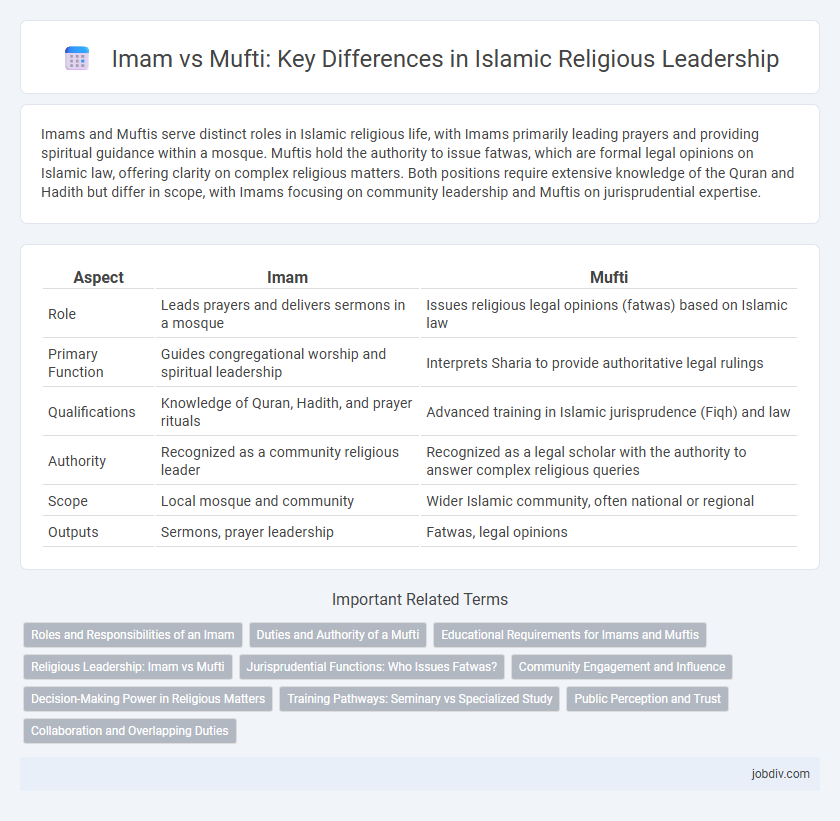Imams and Muftis serve distinct roles in Islamic religious life, with Imams primarily leading prayers and providing spiritual guidance within a mosque. Muftis hold the authority to issue fatwas, which are formal legal opinions on Islamic law, offering clarity on complex religious matters. Both positions require extensive knowledge of the Quran and Hadith but differ in scope, with Imams focusing on community leadership and Muftis on jurisprudential expertise.
Table of Comparison
| Aspect | Imam | Mufti |
|---|---|---|
| Role | Leads prayers and delivers sermons in a mosque | Issues religious legal opinions (fatwas) based on Islamic law |
| Primary Function | Guides congregational worship and spiritual leadership | Interprets Sharia to provide authoritative legal rulings |
| Qualifications | Knowledge of Quran, Hadith, and prayer rituals | Advanced training in Islamic jurisprudence (Fiqh) and law |
| Authority | Recognized as a community religious leader | Recognized as a legal scholar with the authority to answer complex religious queries |
| Scope | Local mosque and community | Wider Islamic community, often national or regional |
| Outputs | Sermons, prayer leadership | Fatwas, legal opinions |
Roles and Responsibilities of an Imam
An Imam primarily leads congregational prayers, delivers sermons (khutbah), and provides spiritual guidance within the mosque setting. They often serve as community leaders, offering counseling, interpreting Islamic teachings, and ensuring religious practices align with Sharia law. Unlike a Mufti who issues formal legal opinions (fatwas), the Imam's role centers on fostering communal worship and nurturing the congregation's faith.
Duties and Authority of a Mufti
A Mufti holds the authority to issue formal legal opinions or fatwas based on Islamic jurisprudence, guiding the community on religious, social, and ethical matters. Unlike an Imam, whose primary duty is leading prayers and providing spiritual guidance at the mosque, the Mufti's role involves deep scholarly interpretation of Sharia law and advising individuals or courts on complex legal questions. The Mufti's expertise in fiqh grants them significant influence in shaping religious practices and resolving disputes within the Muslim community.
Educational Requirements for Imams and Muftis
Imams typically undergo extensive religious education at Islamic seminaries or universities, focusing on Quranic studies, Hadith, jurisprudence (fiqh), and Arabic language to lead prayers and provide community guidance. Muftis require advanced scholarly training, often surpassing that of Imams, with deep specialization in Islamic law (Sharia), issuing fatwas, and mastering classical texts and legal theory. Both roles demand rigorous study, but Muftis must demonstrate exceptional expertise in legal interpretation and jurisprudence to provide authoritative religious rulings.
Religious Leadership: Imam vs Mufti
Imams primarily lead daily prayers, deliver sermons, and provide spiritual guidance within the mosque, serving as community religious leaders. Muftis hold advanced Islamic jurisprudence expertise, issuing formal legal opinions (fatwas) and interpreting Sharia law to resolve complex religious and social matters. Both roles are integral to Islamic religious leadership but differ in scope, with imams focusing on worship and muftis on legal rulings.
Jurisprudential Functions: Who Issues Fatwas?
Imams primarily lead prayers and provide spiritual guidance, but issuing fatwas is the specialized role of Muftis, who are trained experts in Islamic jurisprudence (fiqh). Muftis analyze complex legal questions and derive fatwas based on Quranic interpretation, Hadith, and established Islamic legal methodologies. Their jurisprudential function is crucial in offering authoritative religious rulings that guide Muslim communities in lawful conduct.
Community Engagement and Influence
Imams serve as spiritual leaders in mosques, guiding daily prayers and providing pastoral care that fosters strong community bonds and religious education. Muftis hold authoritative roles in issuing fatwas, influencing community decisions by interpreting Islamic law and addressing social issues with jurisprudential expertise. Both positions significantly shape Muslim community engagement, with Imams emphasizing direct spiritual support and Muftis impacting religious practice through legal guidance.
Decision-Making Power in Religious Matters
Imams lead congregational prayers and provide spiritual guidance but have limited formal authority in issuing legal rulings. Muftis possess specialized training in Islamic jurisprudence and hold decision-making power to issue fatwas, binding religious verdicts on complex legal and ethical matters. The mufti's role is pivotal in interpreting Sharia law, whereas the imam primarily focuses on community leadership and religious practice.
Training Pathways: Seminary vs Specialized Study
Imams typically undergo comprehensive training in Islamic seminaries, where they study Quranic exegesis, Hadith, and jurisprudence to lead congregational prayers and provide spiritual guidance. Muftis engage in specialized study, often pursuing advanced legal education to issue authoritative fatwas and interpret Sharia law in complex cases. The seminary pathway emphasizes pastoral and community leadership, while the Mufti route prioritizes legal expertise and scholarly interpretation.
Public Perception and Trust
Public perception of an Imam often centers on their role as a community spiritual leader and guide in daily religious practices, fostering deep trust through personal interaction and regular guidance. Muftis are primarily seen as authoritative legal scholars responsible for issuing fatwas, which commands respect for their expertise but may create a more distant trust compared to the relational bond with an Imam. Trust in both figures is influenced by their knowledge, piety, and ability to address contemporary issues within Islamic jurisprudence and community needs.
Collaboration and Overlapping Duties
Imams and Muftis often collaborate closely in Islamic communities, with Imams leading congregational prayers and offering spiritual guidance while Muftis provide authoritative legal opinions (fatwas) on complex religious matters. Their overlapping duties include educating the community about Islamic law and ethics, where the Imam's role in preaching complements the Mufti's expertise in jurisprudence, ensuring cohesive religious leadership. This synergy enhances community understanding of faith and practice, fostering a balanced approach to worship and legal interpretation.
Imam vs Mufti Infographic

 jobdiv.com
jobdiv.com